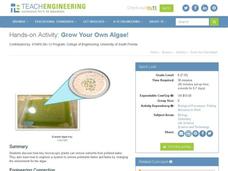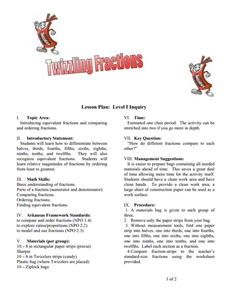Curated OER
Spoonfuls, Cupfuls and Handfuls
Explore the use of non-standard units for measuring volume with elementary learners. They fill a container and count the number used using cups, spoons, and bottles, build with blocks and count the number of blocks used, and compare and...
Teach Engineering
Better By Design
Which modification is the best? Using the scientific method, pairs determine the effects of each control surface on the distance of a glider's flight. The activity, section 16 in a 22-part unit on aviation, allows pupils to gain a better...
Teach Engineering
Egg-cellent Landing
The classic egg-drop experiment gets a new bounce with an activity that asks pairs to design a lander similar to one used to land a rover on Mars within a fixed budget. The activity provides a great introduction to the idea of terminal...
Teach Engineering
Bridge Types: Tensile and Compressive Forces
Bridges rely on tension and compression to keep them standing. Pairs test this principle by constructing simple bridges and applying a force to the center. Teams use the provided worksheet to record their observations of the reaction of...
Teach Engineering
Club Function
Let's get the herd to follow the rules. The activity associated with the second lesson in the unit introduces the class to the definition of a function. Individuals must gather in groups of zebras and rhinos defined by the general...
Teach Engineering
Building an Electromagnet
Your pupils can build their own electromagnet — awesome! The culminating activity in an eight-part series challenges groups to design and build their own electromagnet. The goal of the activity is to build a magnet capable of picking up...
Teach Engineering
Energy Systems
Is electricity created in the outlet? Using posters of several energy systems, collaborative groups identify and describe the parts of their systems. The groups also look at the environmental impacts of the systems and present their...
Teach Engineering
Design and Build a Rube Goldberg
Let's see how complicated we can make this simple task. The last activity associated with a 10-part series has groups design and build a Rube Goldberg machine. Teams determine a simple task to accomplish and use the engineering design...
Teach Engineering
What's Wrong with the Coordinates at the North Pole?
Here is an activity that merges technology with life skills as individuals use Google Earth to explore the differences between coordinate systems and map projections. The self-guided instructional activity is the fourth segment in a...
Teach Engineering
Density Column Lab - Part 1
Mass and density — aren't they the same thing? This activity has groups use balance beams and water displacement to measure several objects. The pupils use the measurements to calculate the density of the objects.
Teach Engineering
Grow Your Own Algae!
Develop a model of a wastewater treatment center. The last activity of the unit has pupils mix a lake water sample into a tank of water containing fertilizers. Over time, the algae from the lake water grows and removes the nutrient-rich...
Teach Engineering
Efficiency of an Electromechanical System
How efficient is a motor in a LEGO set? Future engineers conduct an activity where a LEGO motor-generator system raises an object to a specified height. They then show what they learned and use their measurements to calculate the energy...
Core Knowledge Foundation
Rocks & Minerals
Take young geologists on an exploration of the rock cycle with this six-lesson earth science unit on rocks and minerals. Through a series of discussions, demonstrations, and hands-on investigations your class will learn about the...
Curated OER
Finding Areas of Triangles, Rectangles, and Circles
Students find the areas of geometric shapes. In this geometry lesson plan students find and measure the sides, perimeters, and areas of quadrilaterals, triangles, and circles. Students relate the measures to the others by using formulas.
Curated OER
Area of Rectangles
Seventh graders review the concept of finding the areas of a rectangle. This lesson uses the classroom as a real life application for the formula of area. They measure classroom in order to compute the area.
Teach Engineering
Energy on a Roller Coaster
Roll with your class into the idea of conservation of energy. Pupils use a roller coaster track to collect data to reinforce the concept of conservation of energy and the influence of friction. Class members then create a graph from...
Curated OER
The Game is Afoot - A Study of Sherlock Holmes
Mystery is an exciting genre for young readers to investigate. The plots are so intriguing! Here is a series of lessons featuring Sherlock Holmes stories that invite learners to enter the world of the mystery genre. Based on what they...
University of Arkansas
Twizzling Fractions
Using food as a manipulative is one of the best ways to incorporate hands-on learning in the classroom. This hands-on approach allows young mathematicians to compare, order, and identify fractions with the use of Twizzlers® and fraction...
Curated OER
Stressed and Strained
Students explore stress and strength in engineering design. In this engineering lesson, students become familiar with terminology associated with stress and strain on building material. They will have a class discuss about how their beam...
Curated OER
Volume of Rectangular Prism and Cylinder
Learners calculate volume of rectangular prisms and cylinders. They draw and label figures to use the formulas to calculate the volume of rectangular prisms. In addition, they use objects to calculate volume in a hands on activity.
Curated OER
The Importance of Trees in the Rural Area: Planting a Snowfence
Students discuss the importance of trees and work together to plant a living snowfence. In this tree importance lesson, students discuss why trees are important in rural areas. They use mathematics and team work to plant a living snowfence.
Curated OER
Geometry: Area Project
Sixth graders identify and use area formulas for finding the area of geometric shapes.
Curated OER
Math: Finding Surface Area
Eighth graders engage in hands-on activities to determine the surface areas of various objects. Using boxes, they cut them so they can lay flat and measure all the various shapes, which can be calculated and added together to equal the...
Curated OER
The Ants Go Marching
Integrate art, math, life science, music, and fun in this beginning addition and subtraction activity. Children kinesthetically represent adding and subtracting numbers to 10; they stand up one at a time as you count forward and sit down...

























